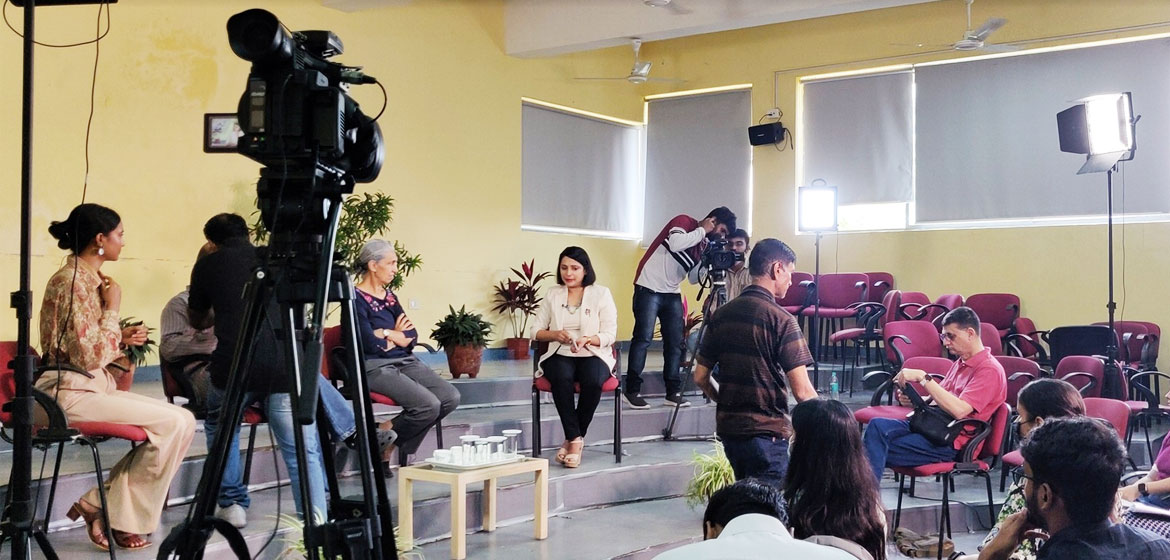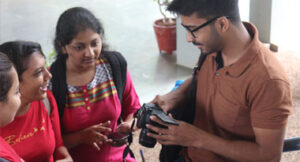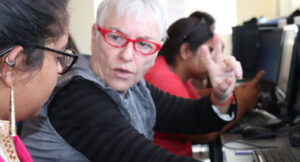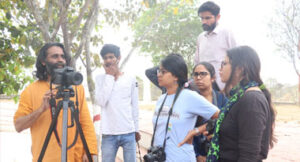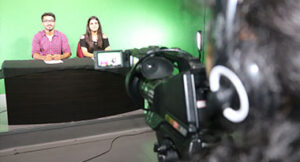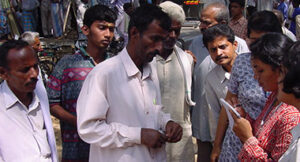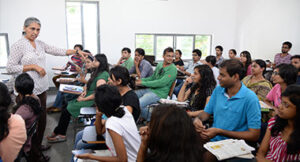Reporting and Writing for Broadcast This course is a requirement for those concentrating in television. Students learn reporting and writing techniques. They learn to recognize what makes news, come up with ideas and report. The emphasis is on getting the facts, verification and balance. This leads to the scripting process, including broadcast style. The emphasis is for students to learn to write for the audio-visual medium, keeping their audiences in mind at all times. Tools of Television This course is a requirement for those in the television stream. Students learn the techniques of shooting and editing. They use international, industry standard video editing software such as Media Composer and production software like i-news in intensive practical sessions each week. Ethical and Legal Issues in Journalism This required course for all students explores the social role of journalism and the journalist from legal, ethical and economic perspectives. It examines the current and historic conflicts between journalists, government and the legal establishment. Issues such as libel, privacy, prior restraint against publishing the news, protection of sources, the right to gather news and national security are explored. Other issues include fairness in journalism and balanced reporting, and ethical considerations in the setting of the news agenda. Convergence Across Media In today’s world, a reporter could be asked to shoot and edit videos (traditionally a part of the broadcast medium), write a text-based article (for print or online) and bring these seemingly diverse aspects together online. This core course ensures that students learn to tell stories in multiple mediums through a single platform, never mind the stream they are specializing in. Critical Thinking in Journalism A journalist does not work independent of the society. While s/he reports on it, s/he is also a part of it. An ability to comprehend, analyze and evaluate unfamiliar material quickly, and think critically is as much a core journalism competency as the ability to identify the news and report on it. In order to be able to think critically, young journalists need background and context. This core course required for all students explains the political, economic and societal contexts in which journalists operate and provides an understanding of democratic functions. It also helps provide paradigms to help the young journalist understand the bigger picture behind the story. (This course is required for all students across both semesters.) Remedial English IIJNM offers Remedial English classes to help students improve their competency in the language. These classes are held several times each week throughout the year focusing on grammar, structure of sentences, organisation of content and other writing skills that are essential for English language journalists. An English language professor with journalism background conducts these classes exclusively. These sessions assist students in writing reports effectively in all other journalism classes. Media Workshop for Television This workshop is designed for the production of news, magazines, and documentary for television. Students put into practice all the television skills learned in other related courses to create programs of different durations appropriate for broadcast. Capstone Project Capstone Project may be executed in Broadcast, Print, or Multimedia. The student adviser helps select a topic and provides guidance throughout the project that runs through the entire year. There is no formal class session; each student works with the adviser constantly throughout the year. The project involves conducting research in a selected topic by collecting large amounts of information, which in turn is analyzed and presented clearly, fairly and interestingly. The project is meant to provide an intellectual challenge to students that goes beyond daily or weekly stories.
| Business and Financial Reporting This course covers business and financial reporting and broad issues and trends within it. The course stresses reporting and writing techniques on business news, and how to interpret and present business and economic events. Development Journalism This course covers key developmental issues such as evaluating the impact of policies and programs. Students are required to examine one or more recent developmental projects and use them as case studies for critically reporting. These will include, but are not limited to issues in health and environment in the first semester and in rural problems in the second semester. International News Coverage This course deals with the techniques and difficulties of international news coverage. It teaches students to gain and report on international viewpoints, and balance with presentations by the national government. Political Reporting This course provides an in-depth analysis of the national and local political landscape. Topics include party politics, campaigns and elections, political propaganda, lobbying and special interests, and other areas. | Television News Features & Documentary Students report and produce stories ranging in length from five to ten minutes, designed for news, magazine and documentary-style programmes. Students work in small teams on feature stories, investigative reports and profiles. Covering Science and Technology Science and technology have become very much a part of our lives that the two are now inseparable. Information technology, for instance, has virtually taken over our daily tasks through devices such as personal computers, mobile phones and automated banking. The media recognizes the need to talk about technology in simple, layman terms so that the general public can understand even complex issues. Many newspapers have introduced technology pages, and more television channels have begun to devote more than a few hours a week to technology news. Some magazines have appointed Science and Technology correspondents. Bangalore is a hub of scientific research institutions and IT related-business activities. Apart from hardware and software, business processing and outsourcing have become a very important aspect of business. IIJNM students are expected to find informative stories from the technology and science sector. Students will study the impact of IT, as well as breakthroughs in bio-technology and medical technology, and learn to report on them in a simple, clear style. Magazine Writing Long-form narrative writings of the form that have appeared in major national and international magazines will be explored. What makes a magazine story different from newspaper reporting? Narrative energy, the story-telling voice, the shift from observation to insight and interviewing techniques are some of the discussion topics. All students with concentration in magazine publishing are required to take this course. Investigative Reporting in Broadcast Students learn to write investigative articles and produce video coverage about government policy implications, public and private practices that impact the public, and activities that are not generally known by digging into not-so-readily available materials, and by interviewing the players involved – in search of facts that are hidden, contradictions and misrepresentations. Examples of major investigations conducted by journalists, investigative reporters and reputed organizations form the basis of the study. Sports Reporting Much more is involved in sports and games these days than who won, who lost and why. Complex questions involve the sociology, the psychology and the business of sport, and perhaps more importantly, the ethics of sport. Opinion and Editorial Writing Students are introduced to editorials and opinions expressed in the media. The course teaches how the subject is chosen, formulated, and presented. The style of writing editorials and opinions is also covered. Covering the Arts and Cultural Events Students will learn to cover different aspects and forms of art, and learn its importance to daily life. The world of ideas is another related area that is both compelling and important to human experience. Further, the impact of “established,” “popular” and “emerging” cultures on society will be examined. Covering Social and Religious Issues These two distinct but inter-related subject areas are of considerable importance to a sustainable and peaceful culture and society. Students will learn to write with an edge about issues of poverty, social class, labour, crime, religion and spirituality, traditions, environment and a host of other topics. Podcasting: Telling audio stories In covering a variety of topics from politics and sports to art and music, traditional media organizations (such as BBC and the Guardian) and independent producers are embracing podcasting as a way to reach their audiences with long-form audio content. Podcast audience is largest among the 18-34 demographic. With increase in Internet penetration in new markets in India, this medium is set to explode in its usage.
This course will teach students how to script, record episodes and interviews, edit and publish podcasts on a variety of topics and platforms. The course will aid students looking to work for radio and multimedia organisations in this rapidly emerging media stream. It will also allow them to tell independent stories that the mainstream media may not have covered adequately. Telling Data stories using Graphic Tools Data is often the source of news stories. It can also be one of the tools with which a story is told. Data offers journalists many new possibilities — from using digital tools to automate the process of gathering and combining information, and using software and data to find connections between thousands of documents and sources. Data journalism further helps to simplify a complex story for the audience through the use of attractive and easy-to-understand infographics.
This course will teach students how to find relevant data using web-scraping tools, analyzing data with Excel and Python, and visualizing data with a variety of software. |
